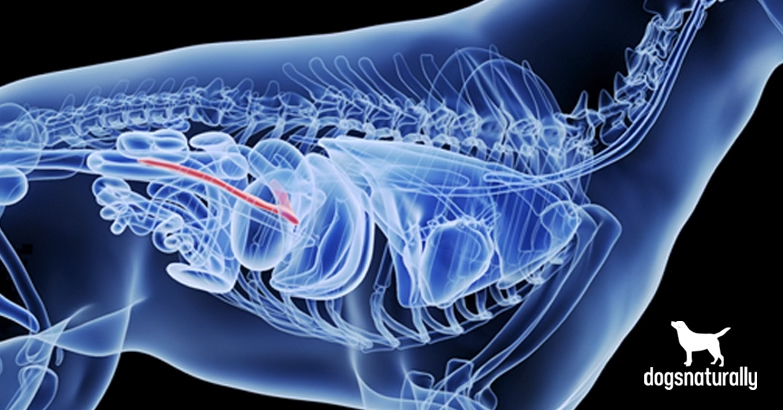EPI in dogs prevents them from absorbing nutrients from their food. When that happens, it’s called malabsorption. Malabsorption is a serious problem … and EPI’s not the only cause. Read on to learn how to recognize the symptoms of malabsorption … plus conditions that might be causing the problem and what to do about them.
What Is Malabsorption In Dogs?
The Merck Veterinary Manual defines malabsorption as “the defective uptake of a dietary constituent resulting from interference with its digestion or absorption…” This is usually caused by a small intestinal disease that interferes with the digestive processes.
How To Recognize Malabsorption
Some common symptoms of malabsorption are:
- Weight loss despite a ravenous appetite
- Eating trash, poop and other inappropriate “foods”
- Large, oily looking stools
- Frequent bowel movements
- Rumbling, gurgling tummy
- Flatulence
- Depression
- Lethargy
- Scruffy looking coat
- Chronic diarrhea
- Vomiting
If your dog’s showing some of these signs of malabsorption, you’ll need to investigate further to determine the cause.
The Merck Veterinary Manual describes some of the ways malabsorption can occur, including:
- Exocrine pancreatic insufficiency (EPI)
- Antibiotic responsive diarrhea (ARD), also known as secondary small intestinal bacterial overgrowth (SIBO)
- Inflammatory bowel disease, mucosal damage
- Villous atrophy (villi are microscopic cells that line the small intestine; they can become damaged through inflammation, leading to leaky gut syndrome)
Here are 3 important disease conditions that could cause malabsorption in your dog.
1. Exocrine Pancreatic Insufficiency (EPI)
EPI is a serious condition that can ultimately lead to starvation if it’s left untreated.
One of the key functions of the pancreas is the exocrine function, which is responsible for producing and excreting digestive enzymes:
- Protease to digest protein
- Lipase to digest fat
- Amylase to digest starches
When the exocrine cells aren’t producing these enzymes, the body can’t break down and absorb nutrients. Eventually this can lead to organ failure and even death.
Chronic loose stools or diarrhea may be the first sign of EPI. Many veterinarians assume the diarrhea is due to intestinal disease … so they may not even think of EPI as a possible cause until they’ve exhausted other possibilities like giardia or other parasites. So keep EPI in mind yourself. Your vet can test for it using a TLI (trypsin-like immunoreactivity) test.
Dogs with EPI will usually seem ravenously hungry, always desperate for food, eating poop or other inappropriate things. They’ll lose weight despite eating everything they can. Eventually they’ll become lethargic and lose interest in activities because of their weakened state.
EPI Treatment
Here’s a summary of EPI treatment in dogs.
Pancreatic Enzymes
EPI in dogs is treated (even in conventional medicine) using pancreatic enzymes to compensate for your dog’s own lacking enzyme production. Porcine enzymes in a powder given with food are considered the best. If your dog doesn’t tolerate pork well, there are also beef-based or plant enzymes.
How To Feed Pancreatic Enzymes
The powder must be “incubated.” This means you need to moisten the powder, and let it sit at room temperature for 20 to 60 minutes before adding it to your dog’s food. Otherwise the enzymes can cause mouth bleeding or sores. If that happens, reducing the dose usually resolves the problem.
Raw Pancreas
Feeding raw pancreas (usually pork, beef or lamb) can do the work of the pancreatic enzymes. According to the Merck Veterinary Manual, 1 to 3 oz of raw pancreas can replace 1 teaspoon of enzyme powder. Incubation of the raw pancreas isn’t necessary – just add it to your dog’s food. Don’t cook the pancreas as heat destroys the enzymes.
Probiotics
Probiotics are an important aspect of managing your dog’s EPI and helping balance her gut bacteria. Feed your dog probiotic-rich foods like fermented veggies or give high quality probiotic and prebiotic supplements. Prebiotics help feed probiotics and make them more effective.
Probiotics For SIBO
You need a specific type of probiotics if your dog has small intestine bacterial overgrowth – known as SIBO, which happens in about 80% of EPI cases. SIBO is when gut bacteria creep into the upper small intestine, where they interfere with nutrient absorption. But don’t give just any probiotic. Most probiotics will feed the small intestinal bacteria and make SIBO worse. Instead feed a soil-based probiotic which has a protective layer that lets it travel to the colon where it will be effective.
RELATED: How to manage SIBO naturally …
EPI Diet
Every EPI dog has different foods they can and can’t tolerate … so you may need to experiment. A raw diet is best to help stabilize EPI dogs because it provides natural live enzymes. Feed smaller, more frequent meals to ease the burden on your dog’s digestive system.
Monitor Nutrient Absorption
Work with your holistic vet to monitor your dog’s nutrient absorption going forward. According to Merck Veterinary Manual, over 80% of EPI dogs are deficient in cobalamin (vitamin B12), and some also may lack nutrients like zinc or vitamins E or K.
2. Inflammatory Bowel Disease (IBD)
IBD means your dog’s gastrointestinal tract becomes overrun with invading inflammatory cells. This type of chronic inflammation can prevent your dog from absorbing nutrients, causing weight loss, as well as vomiting or diarrhea.
There are several different kinds of IBD, depending on which type of inflammatory cells are involved:
- Lymphocytic-plasmacytic IBD: the most common type of IBD, caused by lymphocytes and plasmacytes
- Eosinophilic IBD: less common but more severe, caused by eosinophil cells
- Other rare forms of IBD are granulomatous IBD and neutrophilic IBD
The causes of IBD are not well understood but may include some of these factors:
- Immune system disorders
- Food allergies or intolerances, possibly triggered by vaccines that contain the proteins your dog is allergic to
- Parasitic infections
- Adverse drug reactions
- Antibiotics or antiparasitic drugs, especially with long term use
Symptoms Of IBD
The signs of IBD vary but usually include:
- Diarrhea
- Painful or irregular bowel movements
- Mucous or blood in stool
- Unexplained weight loss
- Chronic flatulence
- Vomiting
- Gastric distention
Some of these symptoms may come and go intermittently.
How To Manage IBD In Dogs
- Feed a natural whole foods based diet
- Eliminate processed foods … especially any food that contains artificial preservatives or colorings
- Avoid antibiotics and other pharmaceutical drugs
- Feed probiotic foods like fermented vegetables
Herbalist Greg Tilford recommends the following herbal formula to help ease IBD symptoms, reduce inflammation and promote healing.
Formula For Inflammatory Bowel Disease
Combine the following herbs using tea, tinctures or dried herbs:
- 2 parts slippery elm or plantain
- 1 part marshmallow root
- 1 part licorice root
- 1 part fennel seed
Twice daily, give your dog 1 Tbsp of dried herbs, or 1 ml of a low alcohol tincture combination, or 2 Tbsp of a strong tea.
3. Dysbiosis And Leaky Gut Syndrome
Leaky gut syndrome can cause malabsorption issues. Leaky gut syndrome is when the gut lining becomes damaged, allowing undigested food particles or other toxic organisms to pass into the bloodstream.Leaky gut stops food from being digested and absorbed properly, so it can lead to nutrient deficiencies.
Dysbiosis is an imbalance of bacteria in the microbiome (the community of microbes in the body), with too many bad bacteria and not enough good bacteria. The bacteria in the microbiome help digest food, regulate the immune system, protect against other bacteria that cause disease, and produce vitamins including B and K and other essential nutrients. Dysbiosis can lead to leaky gut syndrome.
How Does Leaky Gut Happen?
The normal gut lining allows tiny nutrient particles to pass into the bloodstream. Think of it as a tea strainer. This “strainer” also keeps out toxins, pathogens and undigested food particles. The imbalanced gut bacteria in dysbiosis can cause the strainer to become inflamed. Then the holes become stretched, so they don’t filter out toxins, allowing undesirable substances to get into the bloodstream.
The body responds in several ways. The liver has to work harder to screen out the toxins and pathogens. And the immune system is activated to fight the intruders. The body’s systems can get overwhelmed, resulting in inflammation … but as the immune system attacks these intruders, it can also lead to allergies and other chronic disease, including the potential for autoimmune disease. Because these invaders include undigested food particles, the body starts to treat food as its enemy. This means dogs with leaky gut often have multiple allergies to many different proteins as well as vegetables and grains.
Causes Of Leaky Gut
The most likely causes of dysbiosis and leaky gut are:
- Poor diet, especially highly processed, starchy kibbles (whether grain-based or grain-free), as well as genetically modified foods and meats from factory farmed animals
- Drugs and other pharmaceuticals: antibiotics, steroids, NSAIDs (non-steroidal anti-inflammatories), deworming drugs, flea and tick treatments (pesticides)
- Over-vaccination: when the body is forced to respond to a vaccine to which it has already established antibodies, this causes the immune system to react and can provoke a number of chronic diseases
Leaky Gut Symptoms
Many chronic conditions can be caused by leaky gut. About 90% of the immune system is in the gut, so an unhealthy gut can lead to all kinds of different health issues. Some may surprise you – here are a few examples:
- Skin issues or allergies
- Inflammatory bowel disease
- Thyroid problems
- Joint issues or arthritis
- Behavior problems like aggression and obsessive-compulsive disorders or self-mutilation
- Autoimmune disease
- Cancer due to chronic inflammation
Find out if your dog has Leaky Gut with our Leaky Gut Workbook.
How To Manage Leaky Gut In Dogs
First, remove the causes of leaky gut:
- Stop feeding processed foods and switch to a whole foods, preferably raw diet
- Don’t use pharmaceutical drugs
- Minimize vaccinations
Next, support gut healing with food:
- Feed probiotic-rich foods like fermented vegetables (start with a pinch and work up to 1 to 3 tsp per day per 20 lbs of body weight).
- Make bone broth (it’s easy!) and feed 1 Tbsp per day to small dogs, up to 4 Tbsp per day to giant breeds
- Give omega-3 essential fatty acids
- Give MCT oil or hemp seed oil to provide medium chain fatty acid (1 tsp per 10 lbs body weight but start with ¼ this dose and work up)
Then, replenish the gut by adding gut repair supplements.
- Aloe vera 0.5 ml to 1.5 ml per kg
- L-glutamine 500 mg per 25 lbs
- N-acetyl glucosamine (NAG) 250 to 1,000 mg
- Digestive enzymes (buy a product for dogs and follow the label instructions)
Malabsorption diseases are serious so, whatever the reason for it, you’ll want to work with your holistic vet on the best diet and supplements for your dog’s individual condition.












